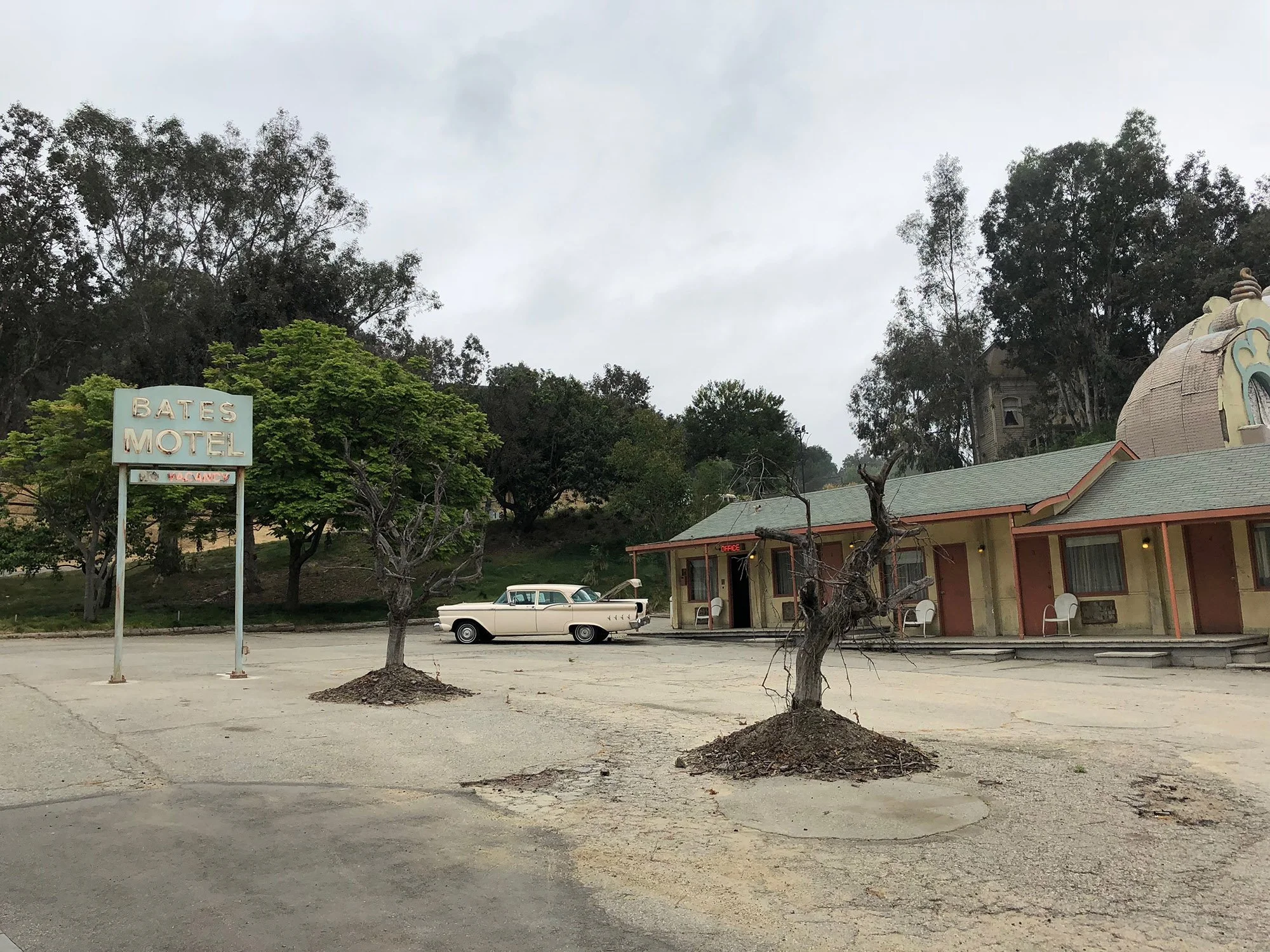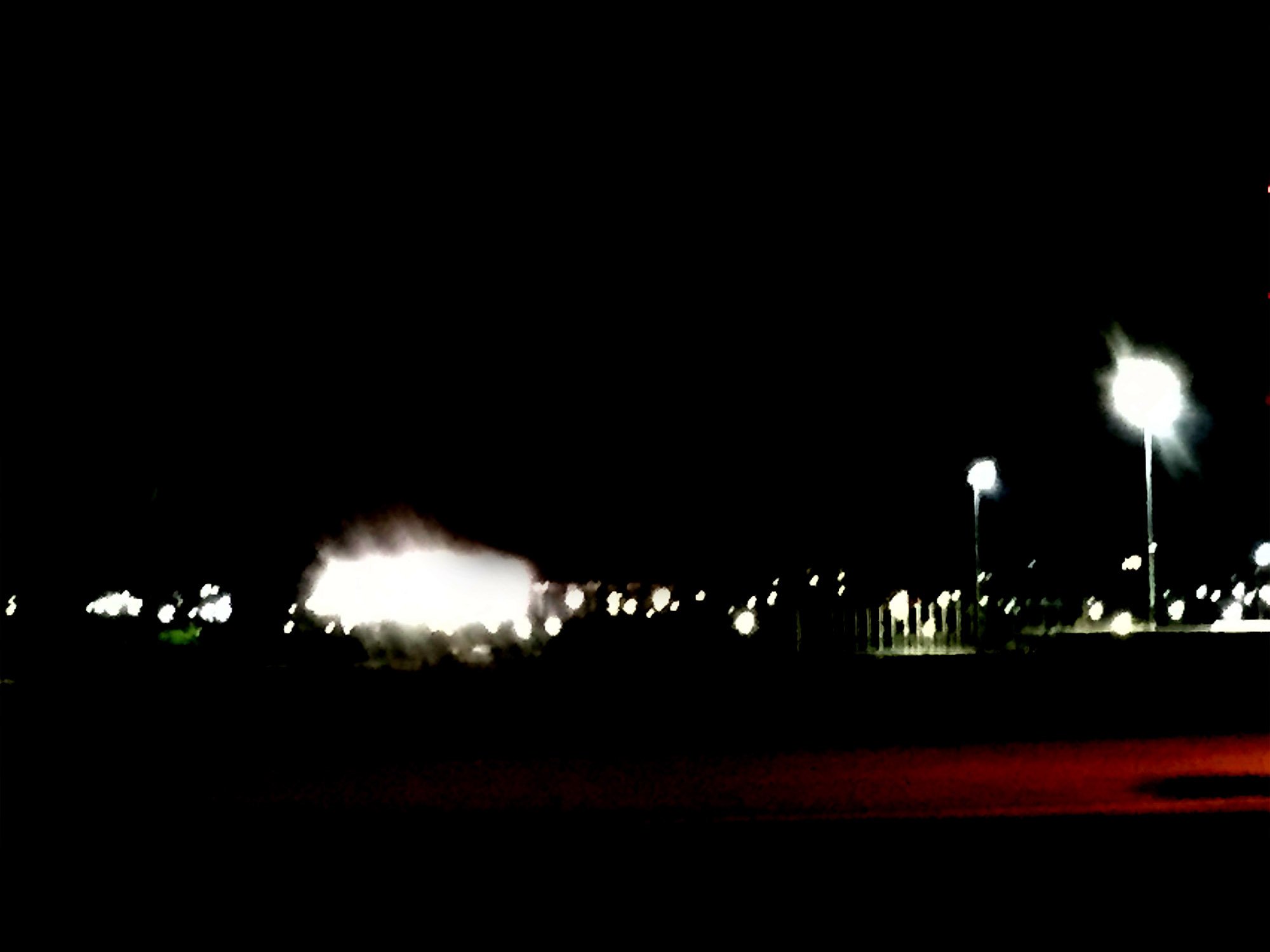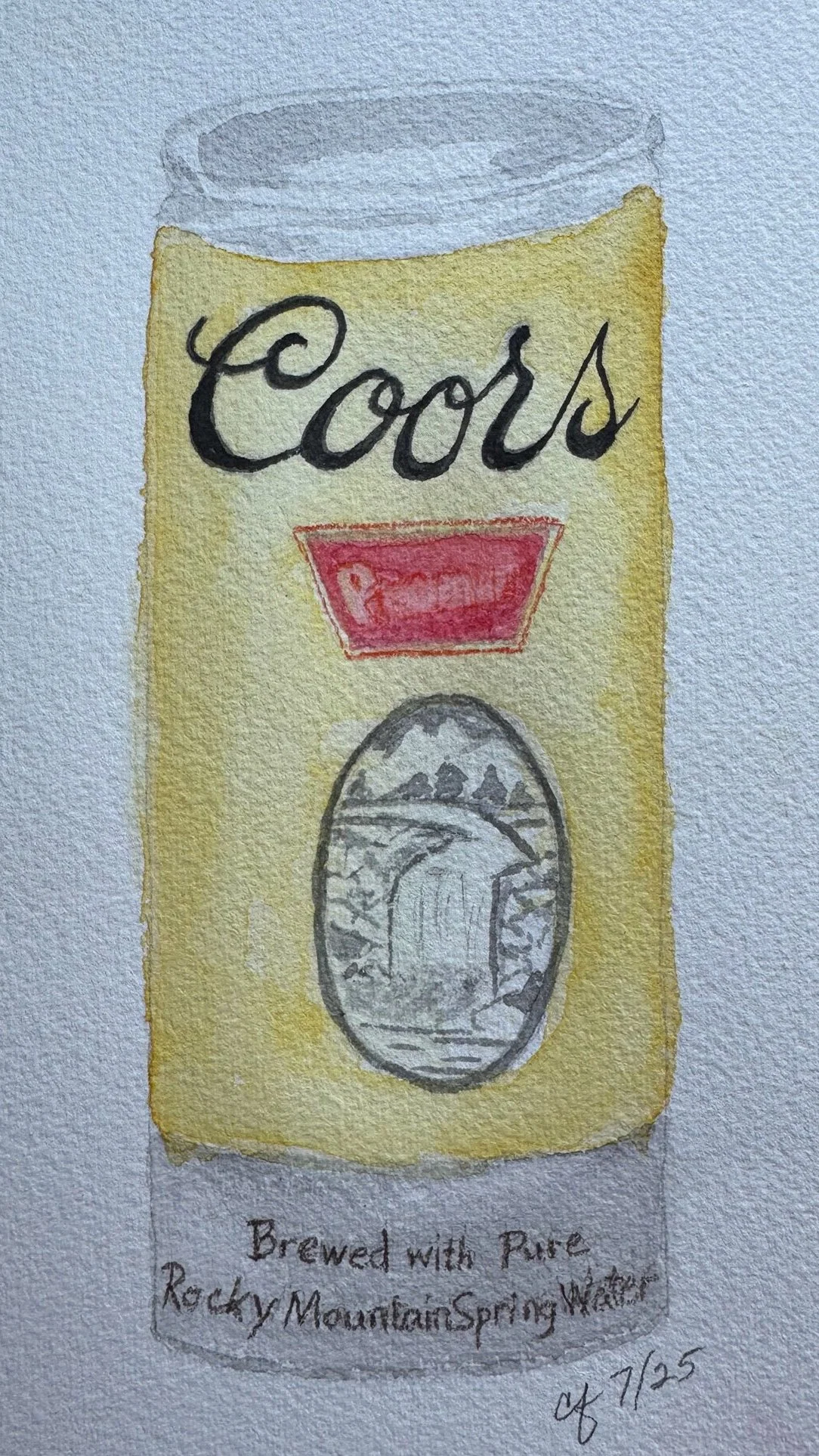The Trip (Part 2)
Who could live out here? Isolation? Heat in the summer? Enough to drive a person crazy. These thoughts surfaced in the conversation between my mom and Aunt Syble while I stared out the backseat window into the moonless night.
The tires crunching the gravel parking lot, once parked in front of the motel, Aunt Syble and I watched Mom enter the office designated by a sign in the window. Through the window we could see a small area with venetian blinds raised and a man sitting behind a counter, which looked like the counter in the office at my elementary school. Just as the man looked up, a woman—a big woman—stepped out from the adjoining room.
Picture I took at Universal Studios years after our experience.
I could see the woman leaning across the counter; the woman appeared friendly. The man sat hunched over a desk reading, seldom glancing at my mom.
Mom said she told the woman, “We’re on our way back to Las Vegas, and wonder how far to the nearest gas station?”
“Nearest town is Barstow,” the woman said. “How far is that?”
“Oh my, that’s all the way to Four Corners,” she replied, as if referring to a landmark anyone would know. “If you’re low on gas, you might not make it.” The woman paused to let the words sink in, studying my mom’s reaction.
“I can take you to the military base. Edwards Air Force Base is about twenty-two miles from here. They know me. They sell gas. Ought to give you enough to get you on your way. Make it to Barstow to fill up.”
My mother agreed to the woman’s plan and before leaving, she ducked into the car to repeat their conversation to Aunt Syble and me.
“I don’t feel good about this. But what can we do?” Mom said. “Lock the doors. Don’t let anyone in. Don’t get out of the car till I get back.” Her words added to my own heightened anxiety about our situation, prickling hairs on my neck, quivering chills beneath my winter coat. The Studebaker Hawk did not have a heater. I was starting to hate that car.
Fear is contagious. Since Mom was afraid, I was too. Aunt Syble seemed oblivious to our troubles. Mom had told us not to get out of the car for any reason, yet within minutes after Mom and the woman had pulled away, Aunt Syble sent me into the motel office to get her a coke.
“Run in there and buy me a coke,” she said, handing me money. Aunt Syble usually ignored what her older sister told her to do, or not do.
Before leaving with the woman, Mom had reminded Aunt Syble about the gun in the glove compartment––the same gun Mom had hidden in the closet with the cookies. Calculating the time the round-trip would take, Mom said that she should be back in about an hour, and if she didn’t return, use the gun if needed to get away. At that point, I was terrified.
As the night devoured the taillights of the wood-paneled station wagon that carried my mother away, I watched until I could see nothing, hoping to submerge the thought that I might again get left behind. Since Renée and Daddy had died, Mom kept reminding me, “. . . You never know when I might be taken.” Her other litany, “It’s always harder for those left behind,” haunting words as well.
As far as I was concerned, the only person on the planet who mattered to me had just driven off with a stranger. Such a bizarre, unanticipated separation, I wanted my mother to come back for me. I’d rather go with her than stay here with Aunt Syble.
That hour passed and the next time Mom opened the car door, she reached across the driver’s seat, panicked, saying, “Get the gun. Get the gun.” Stirred from her repose, Aunt Syble fumbled to open the glove box.
Rattled, almost hysterical, Mom slipped the gun in her coat pocket as she closed the car door, returning to retrieve the gas can from the back of the woman’s station wagon. We all heard a crash when the woman got out of her car. Was it a crowbar, as Mom had imagined during their journey? Or a bat?
Undeniable, something heavy had fallen to the ground. Aunt Syble and I both heard the sound, turned to see the woman pick up something long and heavy. She then walked to the back of her car, cranked down the rear window, and placed the object in the back of the station wagon before releasing the tailgate and removing the gas can.
The whole scene played as if in slow motion. From where I sat, I could see the woman’s broad shoulders blotting out much of the light shining from the one dim light in the parking area. Framed against the rear of the station wagon, she hesitated before moving toward our car with the gasoline can in hand. Watching through the back window, clinging to the front seat and Aunt Syble’s hand, I watched the backlit torsos of my mom and this hefty woman put gas in our car.
I heard muffled words. I bit my lip and held my breath. Inside the car, I felt cold. I could taste fear rising, metallic and dry.
What Happened?
Gravel again crunching beneath the tires, light from the motel sign receded, then disappeared into the blackness behind us.
Mom began to tell Aunt Syble and me what had happened. Her voice trembled; words spilled out, confusion before clarity, we got a replay of what had occurred.
Traveling down a road off the main highway on a moonless night, twenty miles across a desert, Mom said she watched the lights from the base come closer, but the trip had seemed interminable. She kept thinking if they could just make it to the Air Force base, the woman would not hurt her. There would be witnesses at the Air Force base, Mom convinced herself. They would know two persons had come for gas. Mom said she thought that if Aunt Syble and I got away, we would be able to tell our story. Mom prayed.
Picture simulates lights from Edward’s Air Force Base in the distance on a moonless night.
Trying to make conversation with the woman as she drove, Mom asked, “What do you find to do out here?”
“I read a lot.”
A keen reader herself, my mom said, “What do you read?”
“Mostly how to stay out of jail.” That answer met with silence.
The woman then spoke of mysterious disappearances in the desert—people who were never heard from again. Families even. Cars discovered years later. A missing person’s remains stumbled upon. The woman told Mom “Things have happened out here.”
The woman asked if my mother ever read True Detective, a question Aunt Syble would have answered yes.
“How is it that you girls find yourselves out here, traveling alone?” Questions, Mom said, that made her think the woman was probing. Who would miss these three—two women and a young girl? Who would come looking for them?
“Look over at those lights,” the woman said, pointing toward the Air Force Base and the blackness beyond, trying to get my mom to turn away from her, to look off to the right.
“Put this blanket around you. It’s cold.”
My mother sensed the woman intended to use the blanket to immobilize her. Whatever the reason for the blanket, the woman kept reaching for something with her left hand. Mom imagined it was something she could use as a weapon to knock her out.
But it was the woman’s anger at noncompliance that reinforced the fears and images taking shape in my mother’s mind. The woman’s voice rose in volume and pitch whenever my mother refused to do what she told her to do. The rising tension between them heightened my mother’s vigilance. Mom scooted closer to the passenger door and held the door handle tight.
Mom told Aunt Syble and me that she kept praying to God, asking for his protection, even as she resisted the woman’s efforts to bury her in a blanket.
“Put this around you,” the woman insisted. Then the woman would reach again with her left hand next to the seat as if trying to grab something. With frustration turning to anger, my mother said, the woman kept pushing the blanket across the car seat, and almost shouted at her, “Look out over there!”
While the woman had driven slowly to get to the base, she speeded down that same road to get back to the motel, making the return trip without conversation.
No parting words of Thank You or You’re welcome exchanged, the tension lingered. As we drove away, the woman threw the gas can into the back of the station wagon.
Replaying in her own mind what had happened, my mother kept saying, “What if I had been drinking?”
I worried about my mom’s drinking and driving. What could I say or do to make her consider the effects of her drinking on me? I was a kid. And as I grew older, my words had even less effect on her choices.
Before Mom had finished describing what had happened—the conversation with the woman on the way to the base, the eerie silence on the trip back to the motel—the Studebaker topped a rise in the road and we could see something luminous in the distance.
“What is that?” We all strained to identify twinkling lights and their source. Stunned as if viewing the climax to a Twilight Zone episode, we pulled in at a gas station less than ten miles from that motel. Mom said, “Maybe five.”
When Mom rolled down her window, a man asked, “Do you want me to fill ‘er up?”
“How long has this gas station been here?”
The Open 24 hours sign blinked. Mesmerizing. Confusing. Eerie. Scary.
However he answered, the gas station had been there for years. I fell back in my seat, taking in all the words I had heard. Relief and disbelief fought to make sense of what had just happened.
The trip to the military base had taken over an hour, across isolated desert at night. Only minutes further on the main highway had led us to this gas station. Had we kept going in the first place, instead of turning back to seek information at the motel, we would have long since gotten gas and traveled that much further on our journey back home.
From the gas station, Mom then drove up and down streets in Boron––not Barstow, which the woman had claimed was the nearest town. Looking for the police station, this small town had rolled up its sidewalks and the squat building that housed the town’s law enforcement was completely dark. Mom said she wished that she had written down the name of both the motel and the gas station.
While unable to prove that the woman meant to harm us, one question remained. How could anyone explain the bizarre journey to buy a can of gasoline? Attempts to explain this stranger’s eagerness to help when in fact this so-called help caused more than two hours delay in our trip home caused us to doubt that person’s motives. Mom kept saying “person” because she wasn’t convinced that woman wasn’t a man.
My mom, Aunt Syble, and I each believed we had escaped a sinister plot.
Recap
Heightened awareness of her surroundings, as well as greater sensitivity to danger, each of us could see how my mom’s alertness––her sobriety––had kept us from ending up in the desert, anonymous victims of crime.
Yet why did Adolph not make this trip home with us?
With precision timing, something occurred to account for my mother choosing before our trip back to Las Vegas not to drink and drive. An angel, a spirit or in a dream, that midnight message from somewhere or someone accounted for our deliverance. That’s the part that overshadowed our desert crisis.
Edges sharpened as Mom repeated what had happened, details enlarging a picture I would never forget. Slowly, a quiet realization settled and all each of us wanted was to make it home, to awake in our own bed from a terrible nightmare.
Home at last, I wrote in my red diary that “Mom went on the wagon for two weeks,” which was a long time considering how often she went off and on the wagon. Already, I could sense that my mother’s drinking would not stop. And while I continued to wonder if I might ever feel safe and unafraid, I also had no doubt each of us had been spared.
“Our God is a God of salvation,
and to God, the Lord, belong deliverances from death.”





